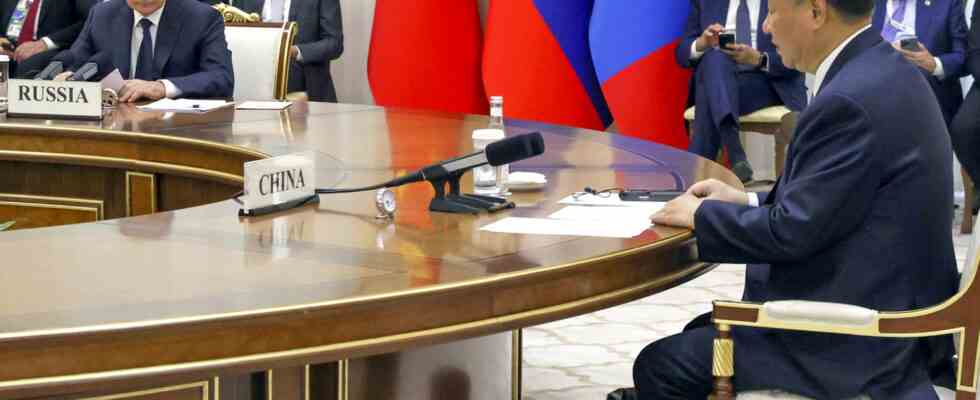interview
As of: 09/15/2022 8:33 p.m
Despite the closeness demonstrated by Xi and Putin, there is an increasing imbalance in the relationship between Russia and China, says historian Urbansky in an interview. This also weakens Moscow’s geostrategic position vis-à-vis Beijing.
tagesschau.de: Is the meeting between Xi and Putin a meeting of equals?
Soren Urbansky: The Chinese government has the diplomatic skills to present relations with Russia to the outside world as a partnership of equals. Xi’s first trip abroad since the beginning of the pandemic does not go to Russia, but to Kazakhstan and Uzbekistan, but the bilateral meeting with Putin in Samarkand was well chosen and also has its diplomatic significance in this sense.
To person
dr Sören Urbansky is a historian and heads the Pacific Office of the German Historical Institute in Berkeley (US state of California). His research interests include the recent history of China and Russia.
Common interests and economic synergies
tagesschau.de: Can one already speak of a Sino-Russian alliance?
Urbansky: Authoritarian states rarely form alliances. But there are overlapping interests. There is a similar understanding of the state. Both regimes are authoritarian. They do have common geopolitical interests. There is the common political enemy, the West, and that creates closeness. And there is a common interest in promoting authoritarian systems in the immediate vicinity, but also beyond.
There is an economic synergy between the two states. Russia is a major exporter of commodities from which China is increasingly benefiting. Russia supplies weapons and military know-how. Russia, in turn, is increasingly dependent on imports of manufactured goods from China, which it can no longer buy in the West.
Putin and Xi discuss Ukraine war at summit in Uzbekistan
Ina Ruck, ARD Moscow, daily news at 3:00 p.m., September 15, 2022
“Increasing Asymmetry in Relation”
tagesschau.de: Seen in this way, did the Ukraine war also put a strain on relations?
Urbansky: Some observers say that Russia has become a vassal of China. I would not go so far. But the growing asymmetry in the relationship is becoming more apparent. Russia lacks alternative export markets for its raw materials, exports of which to China have increased massively. In oil and gas, August was 60 percent above the volume for the same month in 2021.
China imports these commodities very cheaply, bypassing the inflation rates we see here in the West. This growing dependency weakens Russia’s negotiating position in other areas of the relationship – for example with regard to Central Asia. Or with a view to China’s interests in the Arctic.
“China does not benefit for free”
tagesschau.de: So is Russia paying a heavy price for China’s backing?
Urbansky: I believe that the price is not yet fully visible and will continue to develop in the coming years. However, China does not benefit for free either. Ukraine was an important trading partner for China. A third of Ukraine’s grain exports went to China. That is at least temporarily broken. Ukraine was an important transit country in the Silk Road Initiative.
In addition, the war puts China in a position where it must make decisions. Economic relations with the West, with the EU and the USA, are still much more important than economic relations with Russia. And that’s why China makes sure that it complies with the sanctions in order to avoid follow-up sanctions.
“It’s getting harder to maneuver”
tagesschau.de: What does it mean here that the war was not over after a few days, but is now of incalculable length?
Urbansky: The longer this war lasts, the harder it will be for China to maneuver between Russia and the West. And all the more China will feel compelled to position itself more clearly and take sides. This puts China in a dilemma – on the one hand maintaining economic relations with the West, on the other hand continuing to pursue common geostrategic interests with Russia. On the other hand, China benefits internally from the clear image of the enemy formulated by Chinese politicians and the state media – that Russia invaded Ukraine because it was threatened by the West and NATO.
The Kazakhstan factor
tagesschau.de: Does the fact that Xi traveled to Kazakhstan and Uzbekistan first show the limits of the similarities?
Urbansky: Xi has toured Russia eight times, the United States four times, and Kazakhstan four times. This shows the importance that is attached to Russia, but also the importance of Kazakhstan. Here is a common sphere of influence, where Xi launched the Silk Road Initiative in 2013.
Central Asia, because it was formerly part of the Soviet Union, fell into the post-Soviet sphere of influence of Russia. There was a division of labor with China. Russia retained military dominance over the area while allowing China a great deal of economic freedom. This limit is increasingly softening. Here it is interesting that during his visit to Kazakhstan, Xi emphasized the country’s territorial integrity. This may also be in response to fears that Russia might try to annex Russian-dominated parts of Kazakhstan.
Taiwan in mind
tagesschau.de: Is it still true that China is also looking at the Ukraine war with a view to its own claims on Taiwan?
Urbansky: Looking at Taiwan, it is interesting for China to see how the war is progressing militarily, how difficult it is for Russia to take Ukraine, and the high losses that entails. Especially since Taiwan’s military is much more modern and an island has to be defended in a completely different way. But China is also very interested in how the West reacts. China will consider how it can decouple itself from the West so that it does not suffer massively from Western reactions in the event of a similar action, either economically or in some other respect.
The conversation was led by Eckart Aretz, tagesschau.de

